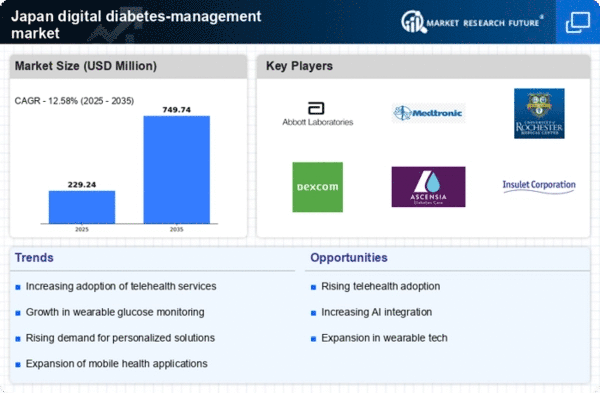Increasing Prevalence of Diabetes
The rising incidence of diabetes in Japan is a critical driver for the digital diabetes-management market. As of recent data, approximately 7.4 million individuals in Japan are diagnosed with diabetes, which translates to about 7.5% of the adult population. This growing prevalence necessitates innovative management solutions, leading to an increased demand for digital tools that assist in monitoring and controlling blood glucose levels. The digital diabetes-management market is likely to expand as healthcare providers and patients seek effective ways to manage diabetes through technology. Furthermore, the aging population in Japan, which is projected to reach 36% by 2040, further exacerbates the need for digital solutions, as older adults are more susceptible to diabetes-related complications.
Government Initiatives and Support
The Japanese government has been actively promoting digital health initiatives, which significantly impacts the digital diabetes-management market. Policies aimed at enhancing healthcare accessibility and efficiency are being implemented, with a focus on integrating technology into patient care. For instance, the Ministry of Health, Labour and Welfare has introduced various programs to encourage the adoption of digital health solutions. This support is expected to drive market growth, as healthcare providers are incentivized to adopt digital diabetes-management tools. Additionally, funding for research and development in digital health technologies is increasing, which may lead to innovative solutions tailored for diabetes management. The government's commitment to improving healthcare outcomes through technology suggests a promising future for the digital diabetes-management market.
Rising Health Awareness Among Consumers
There is a noticeable increase in health awareness among Japanese consumers, which is positively influencing the digital diabetes-management market. As individuals become more informed about the risks associated with diabetes and the importance of effective management, they are more inclined to seek out digital solutions. Surveys indicate that over 60% of Japanese adults are now actively looking for ways to improve their health through technology. This shift in consumer behavior is driving demand for mobile applications and online platforms that facilitate diabetes management. Furthermore, educational campaigns and community programs aimed at promoting healthy lifestyles are likely to enhance the visibility of digital diabetes-management tools, encouraging more individuals to adopt these solutions.
Integration of Data Analytics in Healthcare
The integration of data analytics into healthcare systems is emerging as a pivotal driver for the digital diabetes-management market. In Japan, healthcare providers are increasingly utilizing data analytics to enhance patient care and outcomes. By analyzing patient data, healthcare professionals can identify trends, predict complications, and tailor treatment plans accordingly. This data-driven approach is particularly beneficial for managing chronic conditions like diabetes, where personalized care is essential. The digital diabetes-management market stands to gain from this trend, as analytics tools become more sophisticated and accessible. Moreover, the collaboration between technology companies and healthcare providers to develop analytics solutions is likely to foster innovation, further propelling the market forward.
Technological Advancements in Wearable Devices
The rapid evolution of wearable technology is a significant driver for the digital diabetes-management market. Devices such as smartwatches and fitness trackers are increasingly equipped with features that monitor blood glucose levels, physical activity, and dietary habits. In Japan, the wearable technology market is projected to grow at a CAGR of 15% over the next five years, indicating a strong consumer interest in health-monitoring devices. This trend suggests that more individuals with diabetes may adopt these technologies for better management of their condition. The integration of artificial intelligence and machine learning into these devices could further enhance their capabilities, providing personalized insights and recommendations. As a result, the digital diabetes-management market is likely to benefit from the growing popularity of wearable devices.
















